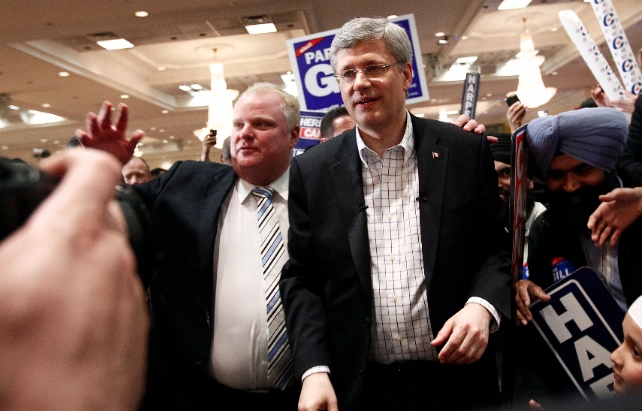
Shared agenda or not, opportunism and power trump all in politics.
If you have teenagers, you might have heard about BFFs (best friends forever) and FWBs (friends with benefits). If you haven’t, it’s probably because your kids have learned to text discreetly with PIR (parent in room). These are important terms to learn – not only because they can help you understand your teens, but also because they provide key insight into the relations among politicians.
Relationships are as essential for politicians as for teens. In Canada, little can get done by a single person or level of government. Like teen relationships, the political kind tend to fracture when one partner feels the commitment offered by another partner is not equal to his or her own efforts or investments. The other partner either cares too little about the relationship or cares too much and becomes a burden to have around.
In a month’s time, all three tiers of government for Toronto might be in the hands of the Conservatives. Toronto Mayor Rob Ford, Ontario Progressive Conservative Leader Tim Hudak, and Canadian Prime Minister Stephen Harper share a common worldview and agenda. An idealist might call them three BFFs. A realist might describe them as FWBs.
Just like BFFs, Harper, Hudak, and Ford are into the same thing (wielding power) and the same ideas (a society where the state plays a smaller role and people rely more on markets and non-governmental and charitable provisions). Like FWBs, the three may like each other, but it is not as if they want to get tied down to one another.
The Ontario provincial election gets off to a nasty start. Read about it here.
With no one at the federal and provincial level to object, we can expect Mayor Ford’s assault on what he sees as extraneous municipal services to go into overdrive. Similarly, we can expect the prime minister and potential premier to take comfort from the fact that the mayor of Toronto is unlikely to make public demarches against a shrinking state as they get down to the hard work of reducing the federal and Ontario government and pushing for the state to have a more modest role in society.
The problem is that no politician can be purely ideological and stay in power, and all three of these guys are intent on being in power. Sooner or later, an issue will come up and one or the other is going to find it necessary to do something that the others see as a betrayal: A federal veto of Ford’s plans to let market forces drive waterfront development in Toronto? A provincial premier who won’t relent on his tirade over the way federal employment insurance provides greater benefits to workers in Quebec than in Ontario? A prime minister who suddenly realizes Ontario is going to resist a new trade and investment deal if it encroaches on the province’s constitutional authority?
When Steve Paikin conducted interviews for his book The Life, which aimed to capture the experiences that politicians had in their jobs, he heard so many negative stories that he wrote a second book called The Dark Side. As anyone who has spent any time in partisan politics knows, he could have written a third book called When We Eat Our Own, describing how members of the same party, often working at the same level of government, turn on one another.
The Mark weighs in on Harper's pitch for a Conservative hat trick.
Whatever else one thinks of Harper, Hudak, and Ford, no one who has voted for them can claim they did not know what they voted for. All three have long-established records and well-documented views in favour of a state that does less for people and costs less to run. That is precisely what voters will get as long as the BFFs/FWBs stick together.
But nothing’s quite as sure as change. Likely, their relationship will have the usual ups and downs. There will be a honeymoon phase, followed by a period when familiarity will turn to a sort of taken-for-granted neglect. This, of course, will be followed by a period during which tensions will start to arise. At the first sign of stress – financial or electoral – one will crack and do something unpleasant to the others. Once the other two see that the first guy only wants to be a FWB, and not a BFF, will they be able to put their relationship back together? Or will their relations become so dysfunctional that carrying out their common agenda of a shrinking state becomes secondary to their desire to one-up one another?
Far fetched? Not really. Just ask Stephen Harper and Danny Williams.
Origin
Source: the Mark
No comments:
Post a Comment